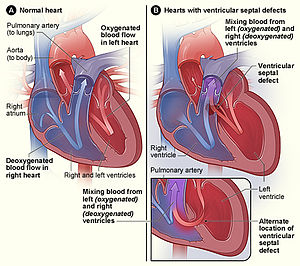Congenital heart defect
| Congenital heart defect | |
|---|---|
 |
|
| The normal structure of the heart (left) in comparison to two common locations for a ventricular septal defect (right), the most common form of congenital heart defect. | |
| Classification and external resources | |
| Specialty | Cardiology |
| ICD-10 | Q20-Q26 |
| ICD-9-CM | 745-747 |
| DiseasesDB | 17017 |
| MedlinePlus | 001114 |
| MeSH | D006330 |
A congenital heart defect (CHD), also known as a congenital heart anomaly or congenital heart disease, is a problem in the structure of the heart that is present at birth. Signs and symptoms depend on the specific type of problem. Symptoms can vary from none to life-threatening. When present they may include rapid breathing, bluish skin, poor weight gain, and feeling tired. It does not cause chest pain. Most congenital heart problems do not occur with other diseases. Complications that can result from heart defects include heart failure.
The cause of a congenital heart defect is often unknown. Certain cases may be due to infections during pregnancy such as rubella, use of certain medications or drugs such as alcohol or tobacco, parents being closely related, or poor nutritional status or obesity in the mother. Having a parent with a congenital heart defect is also a risk factor. A number of genetic conditions are associated with heart defects including Down syndrome, Turner syndrome, and Marfan syndrome. Congenital heart defects are divided into two main groups: cyanotic heart defects and non-cyanotic heart defects, depending on whether the child has the potential to turn bluish in color. The problems may involve the interior walls of the heart, the heart valves, or the large blood vessels that lead to and from the heart.
Congenital heart defects are partly preventable through rubella vaccination, the adding of iodine to salt, and the adding of folic acid to certain food products. Some defects do not need treatment. Other may be effectively treated with catheter based procedures or heart surgery. Occasionally a number of operations may be needed. Occasionally heart transplantation is required. With appropriate treatment outcomes, even with complex problems, are generally good.
...
Wikipedia
